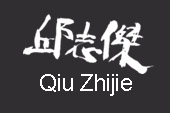 |
Impermanent Brushstrokes • On Writing and Memories |
|||||||
|
Guo Xiaoyan Writing leaves behind traces; indeed, to leave a trace is the very nature of writing. Thus, writing is connected to passion; writing expresses not only the specific content of the text, but also, at its core, the desire to fix and define memory. Copying Lanting Xu a Thousand Times , completed between 1990 and 1995, is a work that suggests an important spiritual message. Through layers and layers of repetitive writing, Qiu Zhijie distilled traditional calligraphy back into abstract traces of ink, which eventually all completely disappeared. The profound yet simple act of writing itself thus came to define the stylized practice of calligraphy. In other words, for the artist, “writing” is culturally determined; through such works, he constantly probes the question, “What is calligraphy?” “Calligraphy is the basic way in which I cultivate myself. It is a way in which I transform my body and thinking, and isolate myself from the quotidian—a daily lesson or exercise.” Qiu Zhijie's Writing 10 Tang Poems Backwards (2000) likewise transcended the rendering of a particular visual style, exemplifying Chinese calligraphy as a type of action. In this work, the erased ink strokes allow the process of “writing” to be highlighted. As Qiu Zhijie puts it, “calligraphy is a living movement that moves and dances on paper; it is ephemeral like snowflakes. The solidified ink attracts the reader's gaze. It makes the gaze decode the movements of many years ago, and causes the gaze to roam and dance with the strokes, leading the two people to a possible encounter. The ink traces become a kind of accident, whereas calligraphy is a type of event, happening between time, space and people.” In July 2008, the second phase of the Nanjing Yangtze River Bridge Project , called “ Where is the Capital of Madagascar? ” was under way. A calligraphy done in blood, it was clearly a letter to those who attempted suicide at the Bridge. When writing with blood, there is a unique sense of solemnity and pain, as well as an opening of the self to all other people, whom one encounters as partners in a shared fate. Consequently, this work reveals Qiu Zhijie's spirituality, egalitarianism, and open-mindedness. Similarly, The One Hundred Surnames Written in Blood contemplates the truth of fate over a long period of time. As our thoughts turn to apocalyptic subjects of life and death, one's personal worries, thoughts and observations might deepen one's relationship with the “other”. Through “a letter written in blood”, Qiu Zhijie forms ties with the world. “In using my blood to write your surname, I am forming a relationship with you. Then, there is an exchange, as you take my book and you leave me your photograph. It is akin to adoption, swearing brotherhood, or marriage. Consequently, one ends up with hundreds of photographs, photographs of people, and every person carries a surname. This fosters many complex relationships—through my book written with blood, all the people involved became one family.” Qiu Zhijie goes on to explain: “Thus, my work became an explanation for the concept of ‘fate'. The first type of fate is the relationship of blood lineage and surname, which is largely accidental, a matter of inheritance; the other type of fate is the relationship between you and me.” Qiu Zhijie's creative work thus uses aspects of Chinese culture to demonstrate the enigmatic relationship between opportunity, fate, time and understanding. Qiu Zhijie's work closely ties writing and fluid movement together. Time is like water—it flows through one's life. The Bridge Archive , the turbulence within the Conch ( Internal Storm , 2009) and the ripples carved on the stones in the Square City ( The City of Defeat, 2009) — all parts of the third phase of the Nanjing Yangtze River Bridge Project—are all representations of flowing water. They are also traces of ink and blood tainted by writing. Bridge Archive consists of various documents about the individuals that were collected during the planning of the Project. This archive is like a spinning whirlpool of individual fates trapped within the socio-political structures of history. Deeply melancholy, the whirlpool's declining currents will all become remnants that await the redemptive fulfillment of promises. When we consider these individuals as historical and political subjects, we also need to translate the possibility of shifting positions and their entailed meanings. What came forth in these stories made people speak the language of today, rather than tell dull stories like narrated history. The conch is like the deepest recesses of our heart; the surface might be tranquil, but a storm brews inside, like ripples that surge into unexpected waves. For Qiu Zhijie, the conch distills and combines the mature essence of the whirlpool, dharma, and the Buddha, and thus functions for him as a metaphor for universal angst. This brings us to Qiu Zhijie's intertextual tendencies, as seen in his early work Writing 10 Tang Poems Backwards (2000), the construction of memories in Memory Test on Tomb-sweeping Day in 1994 and the trace of unfelt emptiness in All the People I Thought of on September 16, 2002 , The City of Defeat (2009), etc. Life, in its unpredictability, bursts with uncontrollable, yet illusory, emotions; however, there is unique wisdom in such emotions. Qiu Zhijie bears the rare, indefinable yet open understanding of his generation, melded with elements of Asian culture. He has taken profound experiences and subjects as the foundation of his spiritual creativity. |